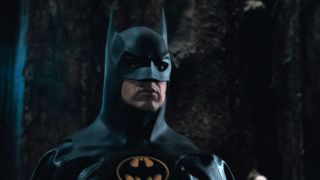Joss Whedon Describes His Favorite Scene From His Rejected Batman Script

There are a gazillion interviews out there with Joss Whedon this week-- and we'll have one soon, believe me!-- because, as you might have heard, the geek icon has directed this movie called The Avengers, and it's probably going to be a big deal. But the good thing is that Whedon has countless fascinating stories to tell, both because of how long he's been working in the trenches punching up dozens of scripts that weren't his own-- including Toy Story-- and how many projects he's pushed himself, whether they ever made it into existence or not. Whedon's story until now had been one of occasional, sometimes compromised success-- the aborted runs of Firefly and Dollhouse, the successful Buffy and Angel series-- and that included a lot of stabs at tackling other superheroes, including Wonder Woman famously, as well as Batman.
Before Christopher Nolan completely transformed The Dark Knight's role in popular culture, Whedon had a meeting with Warner Bros. for his own take on the character-- and from the way he described it in an interview with GQ, it wasn't just different from Nolan's story, but inherently Whedon-esque in the way it handled the character's motivation. In short, it made billionaire Bruce Wayne something of an outcast:
There was a lot more, in Whedon's take, about the orphaned Bruce Wayne as a morbid, death-obsessed kid. There was a scene—Whedon used to well up, just thinking about it—where young Bruce tries to protect this girl from being bullied in an alley, an alley like the one his parents were murdered in."And he's like this tiny 12-year-old who's about to get the shit kicked out of him. And then it cuts to Wayne Manor, and Alfred is running like something terrible has happened, and he finds Bruce, and he's back from the fight, and he's completely fine. And Bruce is like, 'I stopped them. I can stop them.' That was the moment for me. When he goes 'Oh, wait a minute; I can actually do something about this.' The moment he gets that purpose, instead of just sort of being overwhelmed by the grief of his parents' death."
As you might imagine, Warner Bros. didn't run with his idea, and Whedon was so invested in it that he was devastated-- and that was even before he got the call, the same day, telling him that Firefly was cancelled. One of the many reasons Whedon has developed such a devoted fanbase is because of his successes combined with his failures-- the notion that he was out there struggling just like we were, and even being a brilliant writer and the creator of something as successful as Buffy didn't guarantee anything. Now that Whedon is almost literally on top of the world with The Avengers, it's a success we can all share in-- and with Whedon now about as wealthy as Bruce Wayne, his future successes seem a lot more certain thees days.
CINEMABLEND NEWSLETTER
Your Daily Blend of Entertainment News
Staff Writer at CinemaBlend
Most Popular





